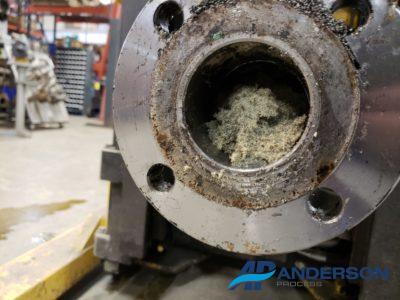
The pump is the heart of any fluid processing application. Properly specified pump drives output and directly impacts an operation’s bottom line. Unfortunately, pumps can fail at any given moment resulting in inefficient operation, equipment failures and production losses.
So why do pumps fail? We had our in-house pump expert and seasoned sales representative, John Vorpagel, takes us through some of the top reason he sees pump failure in the field.
- Pumps that run dry: People forget to open valves before they turn on a pump or they empty a tank and leave the pump to run dry. This will almost certainly cause the mechanical seal to fail. This can be alleviated by using load sensors, flow switches or in some cases level switches.
- Picking the wrong materials for mechanical seals: This can include picking the wrong combination of faces for the application, wrong elastomers or even the wrong type of mechanical seal. Always be aware of products that can build crystals on seal faces that cause the seal faces to open up over time and cause a leak. Salts and sugars can build crystals on seal faces among many other things. Certain products can also glue seal faces together during down time and cause the faces to rip apart upon start up. This can cause the pins that keep the seal faces from turning (anti-rotation pins) to bend or even shear off. This can also cause the seal face to crack or break. In these cases, consider a flush (could be as simple as a fresh water flush) or even a double seal.
- Oversizing the hydraulic performance: Adding margin during the design, specifying, and selection phases of the project can result in significantly oversized pumps. Variable frequency drives, readily available and attractively priced today, are a good solution to the problem. Always be aware that pumps can have critical shaft speeds and make sure that you don’t operate the pump at those speeds.
- Misapplication of the pump: There’s a lot of factors involved in choosing a pump. Sometimes the person selecting the pump lacks the experience in certain applications and selects something that is not right for the design. While there is usually more than one pump that can be picked for an application, there is always an optimal choice. We can help you determine which pump is best for your application.
- Pipe strain: Pipe strain is created when there is a misalignment between a machine and the piping that connects to it. Even minor misalignments can eventually cause bearings to fail. We see this especially in vertical pumps where pipe strain can put such a load on the pumps bearings that they fail prematurely.
- Pumps running deadheaded or running off the end of the pump curve: Both are bad for pumps. Try to run as close to BEP (best efficiency point) as possible.
- Mechanical seals installed improperly: Seals typically have an installed height that must be met for proper operation. We have seen every possible way NOT to install seals properly. We have seen parts left out, springs grossly under or over compressed, and even silicone used to try to hold seals into housings that are worn out. Ensure you are installing seals to specifications and don’t take shortcuts for a “quick fix”.
- Use of cheap bearings: Anderson Process tries to only use quality name brand bearings. I have been known to walk through the shop and throw brand new cheap bearings right in the garbage. We see cheap bearings fail much quicker than quality ones. Why buy cheap bearings to save a few dollars only to have that bearing fail and destroy and expensive mechanical seal or expensive pump parts? Just don’t do it.
- Failure of items other than the pump: Failure of other components can cause the pump to suffer damage. We have seen valves that look like they are open, but they are actually closed causing the pump to run deadheaded. Keep an eye all components to ensure they are working properly.
- No strainers: In systems that could ingest debris such as bolts, nuts, wood from pallets or other debris, strainers are a necessity.
- Cavitation: Cavitation can be an issue when pumping at higher temperatures, near boiling points, at higher viscosities, long suction lines and others. Cavitation will cause pitting of the impeller and eventual pump failure.
- Improper or failed seal support: For media that is hot, crystallizing, viscous, abrasive, ect., seals typically require some sort of support. The support types have been codified by the API as Seal Support Plans.
- Lubrication issues: This is a broad topic, covering over/under lubrication, cross contamination of lubricants, incorrect lubricant for the operating conditions, excessive change intervals and dirt and moisture ingress into the bearing grease or oil sump.
- Misalignment: Depending on the degree of misalignment, shaft speed, alignment technique and other variables like operating temperature, this can cause damage to seals and bearings.
- Baseplate eroded or inadequate: Baseplates should be secure and grouted.
- Operating speed close to the system’s natural resonance: Harmonics from this type of vibration can be difficult to detect without proper equipment and training/experience.
While there is no single change that can eliminate all of the causes discussed above, some simple changes can significantly reduce the chances of a pump failure from taking place. With decades of experience in the industrial pump market space and a robust inventory of OEM parts at our disposal, Anderson Process is uniquely positioned to deliver superior refurbishment and aftermarket services for even the most complex liquid process equipment challenges. As an authorized service center for many of the industrial process market’s top pump manufacturers, our technicians provide the expert, hands-on service needed to get equipment back on-line quickly and to keep your fluid processing operation running as efficiently as possible for as long as possible.
